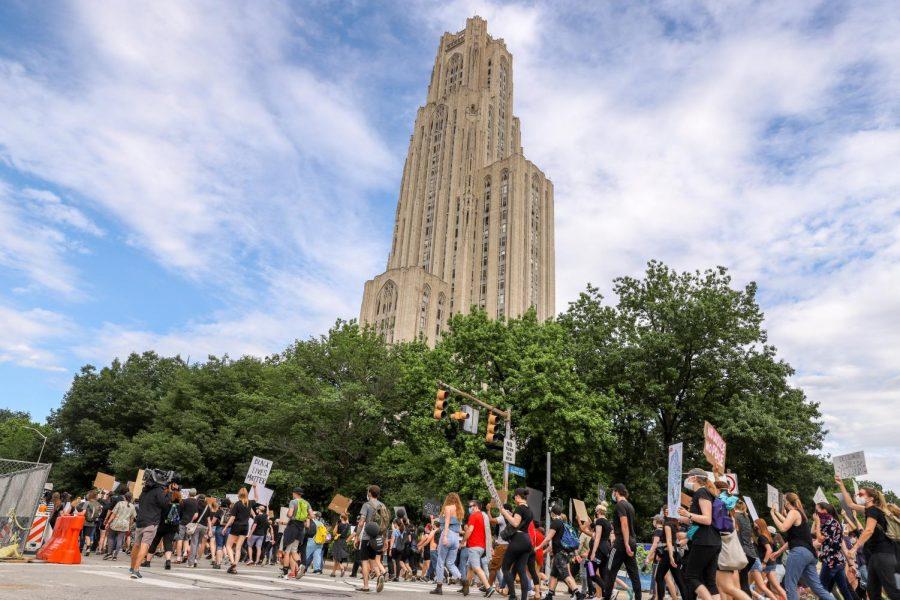Editorial | Universities need public guidelines in addressing hate speech
Protesters march down Fifth Avenue in the shadow of the Cathedral of Learning at a protest on Saturday.
June 16, 2020
A series of racist screenshots emerged on Twitter a few weeks ago, where a student set to attend Pitt in the fall said, in short, that racism is not real, and white people are more oppressed than people of color. Students from universities across the country were outraged.
“This kid is set to attend Pitt in the fall,” someone tweeted, tagging the University. “[A]s a current Pitt student I am asking you to please take action, I will not tolerate this sort of behavior and language on my campus.”
Multiple social media posts showing university students from across the country making racist or hateful remarks have surfaced over the past couple weeks. Along with Pitt, Temple and Penn State universities have also had incidents. Students are demanding universities take action and either expel the students — in the case of Temple and Penn State — or deny the student admission to the University — in the case of Pitt.
“Thank you for sharing this with us,” Pitt wrote on Twitter, in response to the tweet about the incoming student. “We want to confirm that this has been brought to our attention and we have shared with the appropriate offices at Pitt. Please know this does not align with our core values and mission.”
Like Pitt, most universities are not doing much more than acknowledging the situation and denouncing it, or citing that they cannot expel someone due to hate speech, no matter how wrong it is. The Pitt Student Code of Conduct acknowledges that students have the right to be free from discrimination, but does not specifically address protected and unprotected speech. This, along with everything that has happened at Penn State and Temple, is why universities need clear criteria when addressing situations such as these. The First Amendment can’t be an excuse not to act anymore, especially with racist and other hateful rhetoric popping up all over campuses nationwide right now.
Hate speech is notoriously hard to define — so hard to define that many Americans have called for a hate speech law. Often, hate speech is protected under the First Amendment, which is what led Penn State to say its hands were tied after a student was exposed for drawing Nazi swastikas on her skin and when a video of a separate student making racist remarks at a Black Lives Matter protest emerged. It’s also why Temple cited that, despite a series of racist posts from incoming and current students, it has to uphold the students’ First Amendment rights, no matter how terrible the remark.
But this ignores the fact that keeping students making hateful remarks on campus goes against a core value of universities — making campus a safe space for all students to learn. Two organizations at Penn State — the Student Black Caucus and the PSU chapter of the NAACP, said the university was not protecting its students.
“Penn State made a commitment to ‘foster and maintain a safe environment of respect and inclusion.’ We call on them to honor this commitment and hold [the alleged student] accountable,” the organizations said. “Penn State has a duty to protect its Black community. We stand with our Black community and demand justice and respect.”
Students on campus need to know how they’ll be protected, and universities like Pitt need a course of action for when situations such as these arise. If hate speech doesn’t “align with [Pitt’s] core values and mission,” then students deserve to know how Pitt will handle the situation.



